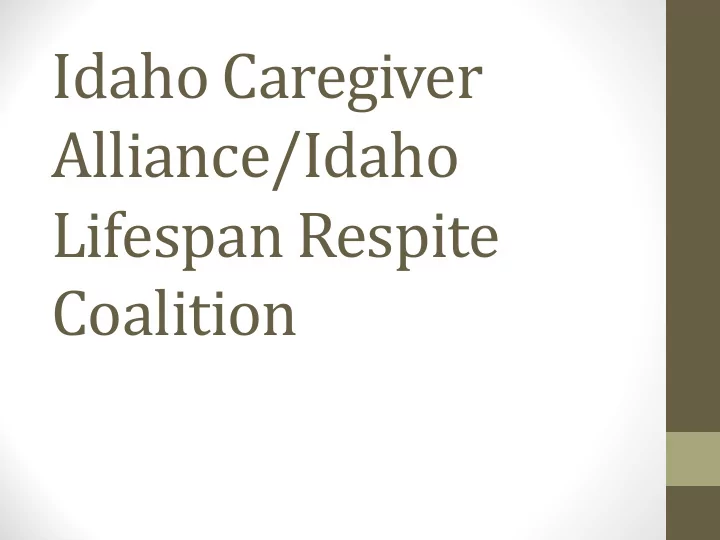

Idaho Caregiver Alliance/Idaho Lifespan Respite Coalition
Caregivers
Care Receivers
The reality for many caregivers
Potential Need for Respite: 277,290 – 320,000 caregivers ∗ Senior Population ∗ Veterans ∗ Children ∗ Adults ∗ Children living in a grandparent- headed household
Snapshot of Community and Organizational Capacity • Social Services • Infant Toddler Program • Children’s Mental Health Services • Council on Developmental Disabilities • State Independent Living Council and Centers for Independent Living • Idaho Commission on Aging/Area Agencies on Aging • A and D and DD waivers • Veteran Services • Wounded Warrior Project • AmeriCorps Legacy Corps Caregiver Support Non-profit organizations and volunteers
Community Respite Based Providers Agencies Idaho Caregiver Alliance State State State Organizations Organizations Initiatives (SHIP, NWD) Volunteer Planning and Organizations Advocacy Groups
Mission The Idaho Caregiver Alliance promotes collaboration that improves access to quality, responsive lifespan respite and other caregiver supports, advancing the well-being of caregivers across Idaho.
Goal Lifespan Respite Project Enhance community-based supports for caregivers and recipients of care, including sustainable resource network for lifespan respite • Progress: • Completed Needs and Capacity Assessment • Enhance Regional Networks • Lewiston Lifespan Respite/Idaho Caregiver Summit July 16 • Idaho Falls during fall 2015
Progress • Increase Awareness and Access to Respite • Project with 211 • Caregiver Task Force Concurrent Resolution passed • Integrate with other state initiatives • Statewide Healthcare Innovation Plan • No Wrong Door • Emergency Caregiver Respite project launched
Caregiver and Capacity Assessment, 2014
Caregiver Needs Assessment • A “snap shot” • Identify gaps in support • On-line survey • Jan – August 2014 • Target audience – unpaid caregivers • More than 246 responses
“Snap Shot” of a Caregiver in Idaho • Most aware (82.6%), but had not used respite (73%) • Female (82.5%) • 55 + years of age (58%) • Caregiver for 4 + years (63.2%) • Cares for one person (59.5%), most often a parent • Provides care 24/7 (34.3%) • Employed full time or part time (57.2%)
Snap Shot of Care Receivers Parent or Parent-in-law 72 Minor Child 42 Spouse or partner 37 Adult Child Relationship 34 Other relative 15 Friend or Neighbor 7 Grandparent 2 Other 5 0 10 20 30 40 50 60 70 80 Number of Individuals
Survey said . . . • 70% do not know where to find respite services • If caregivers could secure respite, they would use the services once a month or more • Previous use of respite did not meet caregiver needs
Frequently identified barriers • Unable to locate services • Cannot afford respite • Concerned about an outsider providing care • Do not qualify for respite services • Care recipient refuses help from others
Priority Needs and Next Steps 1. Services perceived to be unavailable. • Promote respite services • Use a common language • Promote the value of support 2. Help caregivers overcome barriers. • Consumer and provider education • Promote quality assurance measures 3. Access points for information and services. • Consumer-driven access points • Empower caregivers to make informed decisions
Capacity Assessment • Information collected from online resources and key informant agencies. • AARP’s Idaho Price Guide to Long-Term Care Insurances & Services (2013) • Idaho 2-1-1 Careline • Idaho Department of Health and Welfare • Idaho Federation of Families for Children’s Mental Health • Idaho Senior Blue Book • Area Agency on Aging, Area 1 – 5 • Children’s Mental Health, Region 3 and 7
Enhanced regional networks
Increase Awareness and Access to Respite
Caregiver Task Force
Caregiver Task Force http://www.legislature.idaho.gov/legislation/2015/HCR024.htm
Integration with statewide initiatives
SHIP Supporting Goals Goal 1: Transform primary care practices across the state into patient centered medical homes (PCMHs). Goal 2: Improve care coordination through the use of electronic health records (EHRs) and health data connections among PCMHs and across the medical neighborhood. Goal 3: Establish regional collaboratives to support the integration of each PCMH with the broader medical neighborhood.
SHIP Supporting Goals Goal 4: Improve rural patient access to PCMH by developing virtual PCMHs. Goal 5: Build a statewide data analytics system. Goal 6: Align payment mechanisms across payers to transform payment methodology from volume to value. Goal 7: Reduce healthcare costs.
Oversees the development of this performance driven population management system Idaho Healthcare Coalition Support practices in transformation to a PCMH Provides primary care services and RCs coordinates care across the larger medical neighborhood of specialists, hospitals, behavioral health and long- term care services and supports PCMH and Medical Neighborhood Care Team Improved health by receiving all primary care services through a patient-centered approach Patient 27
IDAHO N O W RONG D OOR G RANT Goal: Establish a three year NWD strategic plan to address the gaps in access to Long Term Care Services and Support (LTSS) for Idaho seniors and people with disabilities through one No Wrong Door. No Wrong Door Mission: Empower people to make long term care (LTC) decisions by providing reliable resource information and person centered counseling through a network of community organizations.
Emergency Caregiver Respite
Emergency Caregiver Respite Pilot Project by the Idaho Federation of Families for Children’s Mental Health http://idahofederation.org/respite-care-through-idaho-coalition-for-the-aging /
Thank you Pam Catt-Oliason Program Specialist, Idaho Commission on Aging Pam.Catt-Oliason@aging.idaho.gov Sarah E Toevs Director, Center for the Study of Aging stoevs@boisestate.edu Stephanie Bender-Kitz Project Lead Idaho Community Initiative on Advance Care Planning skitz@jannus.org
Recommend
More recommend